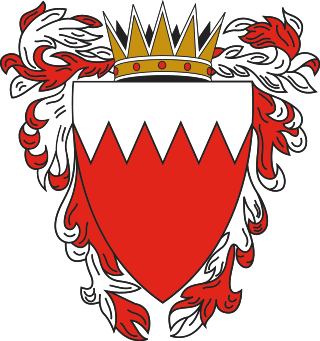Related Research Articles

Polygyny is a form of polygamy entailing the marriage of a man to several women. The term polygyny is from Neoclassical Greek πολυγυνία (polugunía); from Ancient Greek πολύ (polú) 'many', and γυνή (gunḗ) 'woman, wife'.
Polygamy is the practice of marrying multiple spouses. When a man is married to more than one wife at the same time, it is called polygyny. When a woman is married to more than one husband at the same time, it is called polyandry. In sociobiology and zoology, researchers use polygamy in a broad sense to mean any form of multiple mating.

The demographics of the population of Bahrain includes population density, ethnicity, education level, health of the populace, economic status, religious affiliations and other aspects of the population.

Politics of Bahrain has since 2002 taken place in a framework of a constitutional monarchy where the government is appointed by the King of Bahrain, King Hamad bin Isa Al Khalifa. The head of the government since 2020 is Crown Prince Salman bin Hamad Al Khalifa, who became Prime Minister following the death of Khalifa bin Salman Al Khalifa, and who also serves as Deputy Commander of the Bahrain Defence Force. The parliament is a bicameral legislature, with the Council of Representatives elected by universal suffrage, and the Consultative Council appointed directly by the king.

Islam is the state religion in Bahrain. Due to an influx of immigrants and guest workers from non-Muslim countries, such as India, the Philippines and Sri Lanka, the overall percentage of Muslims in the country has declined since the late 20th century. Bahrain's 2010 census indicated that 70.2% of the population is Muslim. The last official census (1941) to include sectarian identification reported 16% as Shia and 84 per cent as Sunni of the Muslim population.

Bahrain's record on human rights has been described by Human Rights Watch as "dismal", and having "deteriorated sharply in the latter half of 2010". Their subsequent report in 2020 noted that the human rights situation in the country had not improved.

Women in Kyrgyzstan traditionally had assigned roles, although only the religious elite sequestered women as was done in other Muslim societies. Rural inhabitants continue the traditional Siberian tribal practice of bride kidnapping. Bride kidnapping, known as ala kachuu, girls as young as 12 years old are kidnapped for forced marriage, by being captured and carried away by groups of men or even relatives who, through violence or deception, take the girl to the abductor's family who forces and coerces the young woman to accept the illegal marriage. In most cases, the young woman is raped immediately in the name of marriage.[8]

Bahrain, officially the Kingdom of Bahrain, is an island country in West Asia. It is situated on the Persian Gulf, and comprises a small archipelago made up of 50 natural islands and an additional 33 artificial islands, centered on Bahrain Island which makes up around 83 percent of the country's landmass. Bahrain is situated between Qatar and the northeastern coast of Saudi Arabia, to which it is connected by the King Fahd Causeway. The population of Bahrain is 1,501,635 as of May 14, 2023, based on elaborations of the United Nations data, of whom 712,362 are Bahraini nationals. Bahrain spans some 760 square kilometres (290 sq mi), and is the third-smallest nation in Asia after the Maldives and Singapore. The capital and largest city is Manama.

There is a low rate of crime in Bahrain. Incidents of petty crime such as pickpocketing and bag snatching are reported especially in the old market areas (souks). Incidents of violent crime are uncommon, but increasing. Though small in size, there is a growing underground drug market in the country. According to Emile Nakhleh, approximately 65% of violent crime and theft are committed by foreign citizens residing in Bahrain.

Women's suffrage was first granted in Utah in 1870, in the pre-federal period, decades before statehood. Among all U.S. states, only Wyoming granted suffrage to women earlier than Utah. Because Utah held two elections before Wyoming, Utah women were the first women to cast ballots in the United States after the start of the suffrage movement. However, in 1887 the Edmunds–Tucker Act was passed by Congress in an effort to curtail Mormon influence in the territorial government, disallowing the enfranchisement of the women residents within Utah Territory. Women regained the vote upon Utah statehood in 1896, when lawmakers included the right in the state constitution.
The legal status of polygamy varies widely around the world. Polygyny is legal in 58 out of nearly 200 sovereign states, the vast majority of them being Muslim-majority countries. Some countries that permit polygamy have restrictions, such as requiring the first wife to give her consent.
The Manama incident on August 26, 2010 involved the arrest in the Seef shopping mall in Manama, Bahrain, of Fakhria al-Singace, the sister of Dr Abdul Jalil Al-Singace, human-rights spokesperson for the Bahrain opposition Haq Movement. According to The New York Times, three women wearing the niqāb and abaya entered the mall and unfurled a banner reading, "It is forbidden to arbitrarily arrest and detain people". More than a dozen plainclothes and uniformed police officers surrounded them, and Fakhria al-Singace was handcuffed and arrested after being pinned spread-eagled to a cafe table. She was released the next day.

Women in Bahrain are discriminated in every aspect of their life and their personal liberties are severely restricted, both by the laws of Bahrain and by Bahraini society in general. Only one-quarter of women in Bahrain hold jobs outside of the household. Bahraini Women's Day is annually celebrated on December 1.
The background of the Bahraini uprising dates back to the beginning of the twentieth century. The Bahraini people have protested sporadically throughout the last decades demanding social, economic and political rights. Demonstrations were present as early as the 1920s and the first municipal election was held in 1926. Ruled by Al Khalifas since 1783, Bahrain was a British protectorate for most of the twentieth century. The National Union Committee (NUC) formed in 1954 was the earliest serious challenge to the status quo. Two year after its formation, NUC leaders were imprisoned and deported by authorities.

Women in Chad, a landlocked country in Central Africa, are the mainstay of its predominantly rural-based economy and they outnumber the men. Chad is a country with diverse and rich cultural practices, such as male beauty pageants and long-kept-secret hair products. Despite their numbers in the general population, there are very few women in governmental positions and gender equality is far from being a reality in Chad. Chad is rated by the World Bank as the third least gender equal country in Africa. Additionally, there are few women who attain higher education, and many who receive a college degree do so outside of the country.

Women played a variety of roles in the Arab Spring, but its impact on women and their rights is unclear. The Arab Spring was a series of demonstrations, protests, and civil wars against authoritarian regimes that started in Tunisia and spread to much of the Arab world. The leaders of Tunisia, Egypt, Libya, and Yemen were overthrown; Bahrain has experienced sustained civil disorder, and the protests in Syria have become a civil war. Other Arab countries experienced protests as well.

Bahraini nationality law states who is a citizen of Bahrain. Foreigners are often given citizenship. Bahraini citizenship laws are governed by the Bahraini Nationality Law of 16 September 1963. Bahrain does not currently permit dual citizenship, and a Bahraini citizen who acquires a foreign citizenship loses Bahraini citizenship. Bahraini citizenship can be renounced. However, in 2016, Bahrainis could have applied to the Ministry of Interior to maintain dual nationality. The king has the discretion to grant Bahraini citizenship to those otherwise not qualified. His Majesty the Governor has the discretion to grant citizenship to an Arab individual who has performed a great service to Bahrain. A Bahraini citizen over the age of 20 years has the right to vote in national elections. Bahraini citizens have a right to a Bahraini passport, though in 1996 the Bahraini government was criticised for refusing to renew the passports of some Bahraini nationals, thus imposing an effective exile on these individuals.
Shirin Fozdar (1905–1992) was a women's rights activist. Born in India, she worked on women's rights and welfare issues in her native country in the 1930s and 1940s. In 1950 she and her husband moved to Singapore to help spread the Baháʼí Faith. In Singapore, she became a champion against marriage inequality and polygamy; she was instrumental in the founding of the Singapore Council of Women and of the nation's Syariah Court, and was a leader in the advocacy effort that saw the Women's Charter become law.

Open slavery existed in Bahrain until the 1930s. Slavery was formally abolished in Bahrain in 1937. Slavery ended earlier in Bahrain than in any other Gulf state, with the exception of Iran and Iraq. Many members of the Afro-Arabian minority are descendants of the former slaves. Slavery of people from Africa and East Asia was succeeded by the modern Kafala system of poor workers from the same region were slaves had previously been imported.
References
- ↑ "Freedom House: Bahrain's Women Rights". Archived from the original on 2018-01-17. Retrieved 2009-03-25.
- ↑ "Kuwait has 'highest rate of polygamy, cousin marriages'". The New Arab . London, United Kingdom. December 4, 2019. Retrieved September 7, 2023.